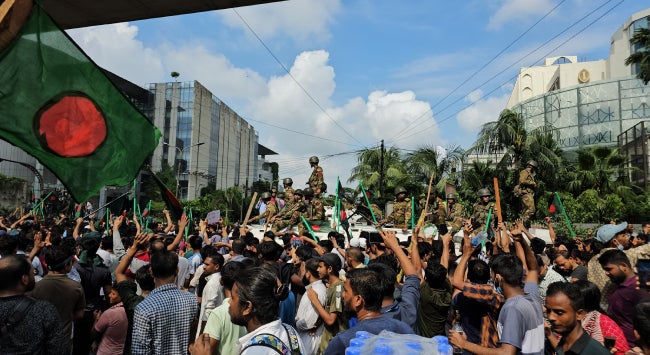Summary
In July 2024, student protests against a contentious reservation policy evolved into a broader movement demanding the ouster of Prime Minister Sheikh Hasina. The protests and the government’s brutal response, which resulted in several hundred deaths, highlighted a deepening divide between the state and the public. With Hasina having fled Bangladesh on 5 August 2024, the challenges of rebuilding trust and legitimacy in the government and institutions will be crucial as the country seeks to restore functional democratic processes.
What began in July 2024 as student protests against a quota, which reserves about a third of government jobs for descendants of war veterans of the country’s 1971 liberation struggle, gained momentum into a broader agitation demanding political reform, government accountability, the protection of civil liberties and the resignation of Prime Minister Sheikh Hasina. The escalation of the protests marked a significant turning point in the country’s politics, as Bangladeshi citizens increasingly questioned the legitimacy and direction of Hasina’s government, which had been in power for the past 15 years.
After weeks of anti-government protests, the situation reached a flashpoint on 4 August 2024 when nearly 100 people were killed, and hundreds injured in clashes between the protesters and the police. The following day, hundreds of demonstrators stormed and ransacked Hasina’s official residence, forcing her to flee the country.
The anti-quota protests tapped into broader issues of social discontent and political unrest in Bangladesh. The controversial elections in January 2024, boycotted by the country’s main opposition group, the Bangladesh Nationalist Party (BNP), saw Hasina’s Awami League party return to power for a fourth consecutive term. The disputed polls signified the continued contraction of the political space for the opposition in the formal political process. It also showcased the Hasina government’s attempt to control politics through constitutional and electoral engineering.
This underscored a growing belief that traditional avenues for political engagement and redress were insufficient or inaccessible, prompting the citizens to seek alternative means of voicing their dissatisfaction and demanding government accountability. For many, including opposition groups, the situation signalled that meaningful political change or even the expression of grievances could no longer be pursued within the formal political system. Instead, they felt compelled to take their concerns to the streets through protests and demonstrations.
Moreover, at a time when inflation, unemployment and economic hardships put to question the developmental gains made and often internationally celebrated under Hasina’s tenure, the system of reservations was seen as an extension of her government’s attempts to control both state and society through the cultivation and reproduction of a loyalist bureaucratic elite with a vested interest in preserving the status quo. This perception of favouritism and manipulation fuelled public resentment, as many felt excluded from the benefits of economic progress and marginalised in the political process.
The Hasina government’s actions and policies operated as mechanisms for subverting the political, social and economic agency of broader Bangladeshi society rather than empowering the citizens during deepening crises. The heavy-handed measures of the security forces to deter the protesters only confirmed these suspicions. As a result, a growing sense of alienation and disenfranchisement exacerbated tensions, eroding trust in the government. While the Awami League leadership denied responsibility for the deaths, casualties and disappearances of student protesters, the United Nations called for an independent investigation into severe human rights violations. Increasingly, the protestors targeted state infrastructure – symbols at the heart of Hasina’s political legitimacy.
The unrest has exacted considerable financial costs too. The protests have resulted in an estimated US$10 billion (S$13.3 billion) in economic losses, significantly undermining investor confidence and damaging the country’s attractiveness as an investment destination. Following Hasina’s resignation, the Army Chief, Waker-uz-Zaman announced plans to form an interim government with the other political parties and pledged to hold fair elections while consulting opposition leaders and civil society members. While these assurances were welcomed, some analysts noted that with the Army replacing Hasina, Bangladesh has come full circle, returning to military dominance reminiscent of her initial rise to power.
Moreover, any interim governing arrangement faces the immediate and gargantuan challenge of managing public expectations for reforms, facilitating political reconciliation, restoring economic confidence and balancing security and stability without exacerbating pre-existing tensions. “With practically every government institution politicised by the Awami League”, a commentator has noted, “distrust of the security services, military, courts and civil service runs deep across society”.
In addition, the interim government must now navigate a polarised political landscape and a power vacuum following Hasina’s long campaign to suppress all opposition. Bangladesh President Mohammed Shahabuddin has announced the release of BNP leader and former prime minister, Khaleda Zia, a bitter rival to Hasina, along with student protesters and those arrested on “false cases”. Hasina’s sudden departure raises questions about how struggles for political control will take shape in a context in which the main alternative – the BNP – faces issues of dynastic politics and cronyism (similar to the Awami League) and independent institutions like the courts and election administrators have become severely undermined. This history of pervasive political instability, deep-rooted corruption and suppressed dissent complicate efforts to establish a stable and democratic governance framework in Bangladesh.
. . . . .
Dr Imran Ahmed is a Research Fellow at the Institute of South Asian Studies (ISAS), an autonomous research institute at the National University of Singapore (NUS). He can be contacted at iahmed@nus.edu.sg. The author bears full responsibility for the facts cited and opinions expressed in this paper.
Pic Credit: Twitter
-
 More From :
More From :
-
 Tags :
Tags :
-
 Download PDF
Download PDF



